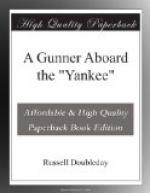“I bet I know the rest,” exclaimed the “Kid,” coming up in time to grasp the situation. “The captain set his prisoners to carrying coal from the after hold forward and then back again, didn’t he?”
“If you fellows think you can tell the story better than I can, go ahead,” retorted “Stump,” in disgust. “You are like a lot of old maids at a sewing circle. I give—”
“What was that?” suddenly cried “Hay,” springing to his feet. “If it wasn’t a flash of light I’ll eat my—”
A figure hastily emerged from the gloom aft.
“Go to your stations at once, you men,” called out a voice. “General quarters!”
As we scurried toward the hatch a great shaft of light appeared off the port beam, and began sweeping back and forth across the black of the horizon.
“Good heavens!” exclaimed “Hay,” “it’s a searchlight on some man-of-war. We’re in for it now!”
CHAPTER XIII.
A narrow escape.
The finger of light sweeping the heavens above the distant horizon meant to us the presence either of friend or foe, and the question was one we had little desire to solve at that moment. Rumors of Spanish warships lurking in the waters adjacent to Cuba were rife, and it had even been stated that another squadron inferior only to Cervera’s fleet was somewhere in the neighborhood.
We of the “Yankee” were willing, and I may say, without undue boasting, eager to meet any vessel of equal size or even larger, but to give battle to a whole fleet was a little too much. Nevertheless, when the word was passed to go to “general quarters,” there was no sulking nor hesitancy.
The battery was ready in record time.
Our gun was placed in trim, ammunition hatches opened, cartridges whipped on deck, and the piece prepared for instant use so rapidly that the officer of the division, Lieutenant Greene, gave us warm praise.
Then we waited.
It is difficult for a layman—a citizen who has not experienced the test of action and danger in battle—to understand or appreciate our feelings that night. It is hard to describe them, to paint with mere words the intense seriousness and gravity of the situation. You can imagine a dark night at sea—a night so black that the senses feel oppressed. You can add to these a thrill of impending danger and a vision of capture by a cruel enemy and the thought that the very next second will sound the signal for an uproar and outbreak of combat, but your impressions will fall far short of the reality—that must be experienced to be appreciated.
As we stood at our stations surrounding Number Eight gun, I tried to read the faces of my companions, to see if I could find in them traces of worry or anxiety, or of fear. The situation warranted even the latter emotion. The dim light cast by the nickering battle lanterns sent fantastic shadows dancing over deck and bulkhead, and caused the men at the guns to resemble, in their stained white working clothes, so many gaunt spectres.




